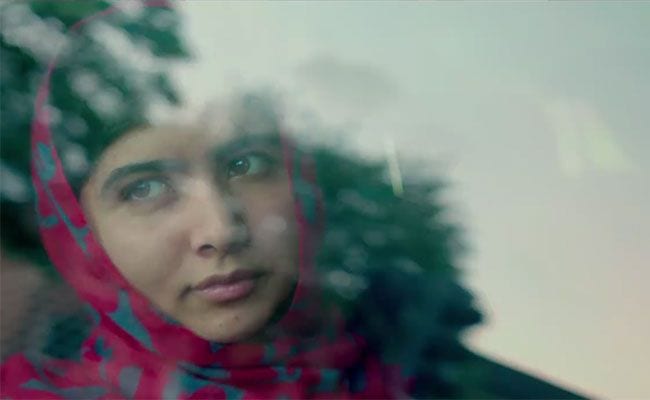
Malala Yousafzai was attacked by Taliban gunmen in Pakistan after she advocated for the education of young women in her country. Her wounds landed her in a coma and have left her with permanent physical damage. This only helped build her resolve against the Taliban.
This much talked-about feature opens with the story of another Malala, the heroine of a legend in Afghanistan, a young woman who died for her beliefs, a young woman whose spirit could not be broken. That’s the inspiring opening of a film that never quite takes flight and never really inspires in the way that the story it wants to tell does. Instead, the film gets lost in a maze of feel goodisms that derail what could have been a thought-provoking picture.
Not that He Named Me Malala doesn’t have its merits. Certainly a young woman who has beat the odds, stood up for her beliefs and captured the world’s imagination can’t make for a dull story. It is interesting when we catch up with her and her family in their new home in Birmingham, England. She attends school like a normal teenager (apparently) and attends events with the likes of Hilary Clinton, Bono and others from around the globe. She visits schools with students who are living in poverty or who are the victims of oppressive political regimes.
She’s also a girl who is caught between two worlds: the Muslim world which her parents were raised in and which she herself was born in, and a more secular Western one. She’s reluctant to discuss whether she likes boys at her school or if dating them is an option, but it’s clear that she holds many of the same interests other teenagers do. It’s also clear that the relocation has been difficult for her family, especially her mother, who is not accustomed to this new world and apparently not accustomed to her daughter’s fame.
Malala’s father, however, is accustomed to the new life and is a capable and vocal champion of his daughter’s efforts, though he himself suffers from a stammer that gets some play in the film. It’s a small digression that takes us far enough off course and for long enough that we lose a little bit of the connection we had with our titular character. In fact, by midway through the film we begin to wonder why we’re watching a picture about this young woman who did something remarkable, though we can’t be entirely sure what. Yes, she wanted young women to go to school but that seems like a remarkable and gross oversimplification.
In fact, it is.
Malala had a long history of action, acting as a blogger, reporting on the troubles caused by the Taliban, including the burning of televisions and banning of images of women in advertising. The Taliban also razed schools, claiming that women did not need education and therefore attempts of young women to become educated were against highly fundamental ideals the group held. This is a significant detail that could have been set up rather easily and very skillfully and much more clearly in the film. It may be hard for some to imagine that there was such deep opposition to girls becoming educated in this century, and thus a better indication of what made Malala brave seems to have been in order.
Equal to that is the lack of an ample back story. Her life in Pakistan is only given the most impressionistic strokes. We need to see a fully realized image of it before we can gain a better understanding of the life she has in the UK. But director Davis Guggenheim (An Inconvenient Truth) opts for an exploration of Malala’s life now, which impressive pales in comparison to the bravery she showed during her time in Pakistan.
Malala’s profile rises as the film continues its path and of course the picture culminates in her winning the Nobel Peace Prize. In some ways that feels like a letdown, a kind of suggestion that at the end of all of this, all the suffering on the part of herself and others, a prize (no matter how prestigious) will somehow make sense or will somehow have been worth the lives lost or the lives forever damaged by the violence of the Taliban and other groups like it. It’s a feel goodism that will play well in high school classrooms, but it doesn’t resonate well outside of that box.
There are other elements that could be probed more deeply, including the family’s faith and how something they clearly hold dear has also been an instrument of suffering for them. It’s important, of course, to have a Malala in this world, and to celebrate the victory of a young woman who has great strength and great character (she is remarkably charismatic, funny and smart, even when the film named after her is not), but not at the expense of suggesting that all that suffering can be worth it if there is worldwide recognition at the end.
No extras worth writing home about, though educators and so forth will find plenty of supplemental materials online. It’s not a bad film, considering that this will most likely find its greatest audience in the classroom.


![Call for Papers: All Things Reconsidered [MUSIC] May-August 2024](https://www.popmatters.com/wp-content/uploads/2024/04/all-things-reconsidered-call-music-may-2024-720x380.jpg)



